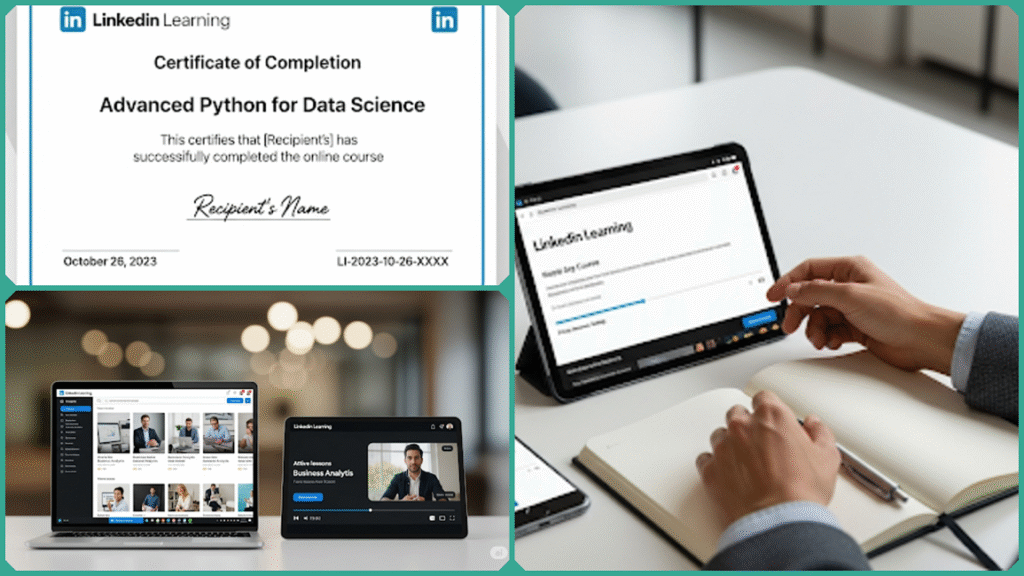9 Underrated LinkedIn Learning Courses for Business Analysts
Estimated reading time: 15 minutes
Business analysts serve as the crucial architects of organizational change, effectively bridging the vital gap between data, strategic planning, and execution. In today’s fast-paced era, where digital transformation, agile methodologies, and data-driven decision-making are becoming the standard, it is more important than ever to continually enhance and upgrade your skill set.
Although LinkedIn Learning provides a comprehensive and robust catalog of courses specifically designed for business analysts, many valuable gems remain under the radar—these hidden resources have the potential to significantly propel your career to new heights but are often overlooked in favor of more popular and widely recognized alternatives.

This comprehensive guide carefully curates nine underrated LinkedIn Learning courses that are specifically tailored for business analysts at various stages of their careers. Whether you are just entering the field, aiming for mid-career advancement, or transitioning from a completely different career path, this thoughtfully selected collection promises to deliver actionable insights and valuable time-saving opportunities designed to help you stand out and excel in your professional journey.
The Importance of Continuous Learning for Business Analysts
The importance of continuous learning for business analysts cannot be overstated, as it plays a crucial role in their ongoing ability to remain effective, adaptable, and relevant within an ever-evolving and constantly changing business landscape. Continuous learning enables them to keep up with new methodologies, tools, and industry trends that are essential for their professional growth and success.
Business analysis is a unique discipline that combines a diverse set of skills, including technical expertise, strategic thinking, and a strong human-centered approach, all of which are essential to driving organizational success and fostering innovation.
According to the International Institute of Business Analysis (IIBA®), highly effective business analysts function at the vital intersection where technology, business goals, and stakeholder requirements converge. In today’s fast-paced and constantly changing environment, keeping skills and knowledge current enables business analysts to:
- Deliver significantly greater business value by closely aligning innovative solutions with the continuously evolving and dynamic organizational goals and priorities. This approach ensures that every solution implemented directly supports the company’s strategic objectives and drives meaningful outcomes.
- Support digital transformation initiatives, which are becoming increasingly essential and often rely heavily on agile processes combined with the integration of emerging technologies such as artificial intelligence (AI) to drive innovation and efficiency.
- Adapt and adjust flexibly to a wide range of new methodologies, including modern agile frameworks and advanced AI-powered tools, thereby significantly enhancing overall efficiency and improving responsiveness in various projects and workflows.
- Enhance your employability and support your career progression by continually maintaining and developing skills that closely align with the evolving and current industry demands. Staying updated with the latest trends and acquiring relevant expertise will ensure you remain a valuable and sought-after professional in your field.
Continuous learning continuously equips business analysts with the essential skills and knowledge they need to remain highly valuable contributors amid the rapid technological advances and ever-changing business landscapes. This ongoing development ensures that their role as strategic facilitators of change remains consistently strong, relevant, and impactful in dynamic environments.
Key Concepts & Theories Every Business Analyst Should Know
Key concepts and theories serve as the essential building blocks for truly mastering the multifaceted role of a business analyst. Developing a deep understanding of these foundational terms and ideas equips professionals with the necessary skills to effectively and efficiently bridge the gap between business requirements and technological solutions.
By grasping these core principles, business analysts are better prepared to analyze, communicate, and implement strategies that align business goals with IT capabilities. Below are the essential concepts that every business analyst should thoroughly know and continually reference throughout their career:
Business Analysis
This is the comprehensive practice of enabling and supporting organizational change by thoroughly defining business needs and recommending effective solutions that deliver significant value. It involves gaining a deep understanding of the current state of the organization, envisioning potential improvements and enhancements, and actively facilitating the implementation process to ensure that strategic goals and objectives are successfully met.
Stakeholder Management
Effective business analysis critically depends on the ability to build and maintain strong, positive relationships with all relevant stakeholders. This ongoing engagement is essential to ensure clear alignment on project goals, objectives, and expectations throughout the project lifecycle.
By skillfully managing the diverse interests, priorities, and concerns of various stakeholders, analysts can foster greater collaboration, secure necessary buy-in, and significantly reduce the risk of misunderstandings or conflicts that could impede project success.
Requirements Elicitation
This is a crucial and highly important skill that involves the systematic process of gathering, carefully analyzing, and thoroughly clarifying the needs and expectations of business users as well as various other key stakeholders. It plays a vital role in ensuring that the solutions developed effectively address the correct problems and are thoughtfully designed to meet genuine and practical demands within the organization.
Process Modeling
This refers to the detailed visualization and systematic mapping of both current and proposed business processes within an organization. By clearly illustrating the workflows, interactions, and sequence of tasks, business analysts are able to thoroughly identify inefficiencies, bottlenecks, and opportunities for improvement. This comprehensive understanding enables them to design more streamlined, effective, and efficient processes that enhance overall business performance and productivity.
Benefits Realization
This important concept goes well beyond simply delivering projects on time and within scope. It emphasizes the critical need to ensure that the solutions implemented generate measurable and meaningful business benefits. This process involves continuously tracking outcomes, carefully evaluating the overall success of the initiatives, and actively optimizing the value derived from them over time to maximize long-term impact and organizational growth.
These foundational skills and core concepts serve as the essential basis for well-established industry standards, including the BABOK® (Business Analysis Body of Knowledge), Agile Analysis methodologies, and various comprehensive frameworks that guide digital transformation efforts.
Together, they provide business analysts with the essential tools and knowledge to confidently lead initiatives and drive meaningful, impactful change within their organizations and projects. This empowerment ensures not only successful outcomes but also fosters a culture of continuous improvement and sustained growth over time.
9 Underrated LinkedIn Learning Courses for Business Analysts
Here are 9 highly underrated LinkedIn Learning courses specifically designed for business analysts, carefully curated for their exceptional practical value and significant impact. These courses are particularly beneficial for professionals who are eager to enhance their skills and knowledge well beyond the fundamental concepts and basic techniques:
Business Analysis Foundations: Communication
- Instructor: Greta Blash
- Mastering effective communication is crucial for business analysts seeking to excel in their roles. This comprehensive course provides a wide range of valuable tools and techniques designed to significantly enhance clarity in all forms of communication. It also focuses on strategies to effectively manage stakeholder expectations, ensuring that all parties remain aligned throughout the project lifecycle. Additionally, the course aims to improve the overall quality of deliverables, which is often an underestimated but incredibly vital skill. These combined abilities play a key role in reducing misunderstandings, minimizing conflicts, and fostering a collaborative working environment that drives project success.
- Case Study: A mid-level analyst observed a significant 30% increase in stakeholder engagement following the successful completion of this comprehensive course. This improvement highlighted the direct impact of the course on practical skills and professional interactions, demonstrating its value in enhancing communication and collaboration within the workplace.
Learning ChatGPT for Business Analysis
- Instructor: Vincent Mirabelli
- Leverage advanced AI-powered tools such as ChatGPT to automate complex data analysis tasks, enhance the process of requirement elicitation with greater precision, and effectively conduct comprehensive scenario planning. This course offers practical, hands-on guidance designed to help you seamlessly integrate generative AI technologies, enabling you to make faster, smarter, and more informed decisions in your projects and workflows.
- Example: One learner was able to save an impressive 20 hours on each project by effectively streamlining their workshops through the use of ChatGPT, significantly improving their overall productivity and efficiency.
Business Benefits Realization Foundations
- Instructor: Laura Paton
- This comprehensive course emphasizes the critical importance of delivering not just immediate solutions but also measurable, sustainable long-term value to organizations. You will learn how to effectively track, measure, and maintain positive business outcomes consistently throughout the entire project lifecycle and well beyond the completion of project execution.
Requirements Elicitation for Business Analysis: Stakeholder Conversations
- Instructor: Angela Wick
- Enhance interviewing techniques by focusing on eliciting clear, detailed requirements from stakeholders, effectively managing challenging and complex stakeholder interactions, and skillfully building consensus among diverse groups—these skills are essential for ensuring overall project success and achieving strong alignment across all involved parties.
Agile Business Analysis
- Instructor: Angela Wick
- As agile methodologies continue to dominate the software development landscape, this comprehensive course thoroughly clarifies the essential role of the business analyst within agile teams. It focuses on effectively managing continuously evolving requirements and actively contributing to the overall success of the product. This course is particularly ideal for professionals who are transitioning from traditional waterfall approaches to agile frameworks. Many organizations that have implemented this training have witnessed significantly improved sprint outcomes and enhanced team collaboration immediately following the completion of the program.
Business Analysis Foundations: Business Process Modeling
- Instructor: Haydn Thomas
- Gain much deeper and more comprehensive insights into complex business processes by mastering advanced modeling techniques that go well beyond simple diagrams. This course is designed to include practical, hands-on exercises that actively engage you in identifying critical bottlenecks and designing highly efficient workflows to optimize overall performance and productivity.
Learning AI for Business Analysis
- Instructor: Angela Wick
- Gain a deep understanding of cutting-edge AI technologies—including advanced natural language generation and sophisticated machine learning techniques—that are fundamentally reshaping the field of business analysis today. Equip yourself with the essential skills and knowledge required to effectively lead and manage AI-driven transformation initiatives within your organization, driving innovation and competitive advantage.
Excel for Business Analysts
- Instructor: Michael McDonald
- Excel remains an essential and powerful tool for anyone involved in data-driven analysis and decision-making processes. This comprehensive course thoroughly covers advanced Excel functions, including the creation and manipulation of pivot tables, in-depth scenario analysis, and automation techniques specifically designed for business analysts. These skills are aimed at significantly increasing both the speed and accuracy of data handling and reporting tasks, enabling professionals to work more efficiently and make better-informed business decisions.
Business Analysis: Essential Tools and Techniques
- Instructor: Jamie Champagne
- Packed with a wide range of practical applications, this comprehensive course introduces essential tools such as traceability matrices, detailed stakeholder analysis, and effective process maps, all designed to help you deliver solid, actionable results on your projects with increased efficiency and clarity.
Each course has been carefully chosen for its exceptional ability to provide actionable, real-world skills that can be immediately applied in professional settings. Many of these courses include detailed case studies that demonstrate tangible benefits in enhancing workplace performance and supporting long-term career growth.
Whether your goal is to refine your communication skills, effectively harness the power of artificial intelligence, or sharpen your expertise in agile methodologies, these often underrated courses present a comprehensive and rich foundation for sustained and meaningful professional advancement over time.
Comparison of the 9 Underrated LinkedIn Learning Courses for Business Analysts
| Course Title | Focus Area | Key Benefit | Instructor |
|---|---|---|---|
| Business Analysis Foundations: Communication | Communication, Stakeholders | Improved engagement, clarity | Greta Blash |
| Learning ChatGPT for Business Analysis | AI, Automation, Innovation | Streamlined analysis, time savings | Vincent Mirabelli |
| Business Benefits Realization Foundations | Strategy, ROI, Value | Business outcome measurement | Laura Paton |
| Requirements Elicitation: Stakeholder Conversations | Stakeholder Interviews | Better requirement gathering | Angela Wick |
| Agile Business Analysis | Agile, Continuous Delivery | Enhanced agile team collaboration | Angela Wick |
| Business Process Modeling | Process Mapping, Analysis | Operational visibility, improvement | Haydn Thomas |
| Learning AI for Business Analysis | AI, Digital Transformation | Future-ready skills, tech fluency | Angela Wick |
| Excel for Business Analysts | Data Analysis, Reporting | Advanced Excel techniques | Michael McDonald |
| Essential Tools and Techniques | BA Tools, Practical Skills | Readily deployable models/tools | Jamie Champagne |
Current Trends and Developments in Business Analysis
Business analysis is currently experiencing a profound and significant transformation, largely driven by rapid technological advancements and the continually evolving needs of modern businesses. These changes are reshaping the way professionals approach analysis and decision-making processes.
Below are some of the key current trends that are actively influencing and shaping the business analysis profession today:
AI & Automation
The seamless integration of advanced artificial intelligence tools such as ChatGPT into everyday business analysis workflows is fundamentally transforming the way analysts approach their tasks. From gathering detailed requirements to analyzing vast amounts of data and effectively managing diverse stakeholders, these cutting-edge technologies are revolutionizing traditional methods.
By significantly enhancing overall efficiency, minimizing manual effort, and enabling more insightful and smarter decision-making processes, AI and automation are becoming indispensable assets in the modern business analysis landscape.
Agile and Hybrid Methodologies
As a growing number of organizations embrace agile and hybrid approaches, business analysts are now more than ever expected to play a crucial role in facilitating continuous improvement processes. They must be able to adapt swiftly to ongoing changes and effectively assist cross-functional teams in maintaining alignment and cohesion within fast-paced, dynamic environments. This evolving expectation highlights the importance of flexibility and collaboration in today’s business landscape.
Data Literacy
In today’s rapidly evolving business environment, analysts are expected to possess advanced data skills that far exceed basic proficiency in Excel. They must demonstrate mastery of sophisticated analytics platforms, cutting-edge data visualization tools, and a broad range of statistical techniques.
These capabilities are essential not only for accurately processing and interpreting complex data sets but also for extracting actionable insights that can significantly influence business strategy and decision-making processes in a meaningful way.
Soft Skills
As collaboration across different teams and departments continues to intensify and become more complex, the importance of communication, negotiation, and leadership skills is rising to match the value traditionally placed on technical expertise.
The ability to effectively convey complex ideas clearly and understandably, while also building consensus among diverse stakeholders, is becoming critical for ensuring the success of projects in today’s dynamic work environment.
Value-driven Delivery
In the evolving field of business analysis, the emphasis is increasingly shifting away from simply delivering solutions to a stronger focus on ensuring that those solutions generate measurable, sustainable, and long-term business impact. This means that analysts are not just concerned with completing projects but are dedicated to understanding and maximizing the real value and benefits that these initiatives bring to the organization.
To support this shift, benefits realization frameworks are becoming essential tools, enabling analysts to effectively track, measure, and optimize the value derived from various initiatives, thereby ensuring that business objectives are truly met and exceeded over time.
Expert Insight
According to extensive research conducted by McKinsey, a significant 70% of digital transformation initiatives do not achieve the desired outcomes, frequently because of unclear requirements and ineffective communication.
These challenges are precisely what the latest evolving trends and specialized courses in business analysis are designed to tackle in a thorough manner, helping organizations improve their chances of success.
In Summary
These emerging trends clearly emphasize that today’s modern business analysts must be highly versatile professionals who seamlessly combine deep technology fluency, adaptive and flexible methodologies, advanced data expertise, and strong interpersonal communication skills. This unique combination enables them to effectively deliver meaningful and measurable business value in an ever-evolving and competitive marketplace.
FAQs
Are LinkedIn Learning courses recognized by employers?
Many LinkedIn Learning courses are endorsed by reputable industry organizations such as the International Institute of Business Analysis (IIBA®). They provide certificates upon completion, which are widely respected and valued for professional development and career advancement.
How do I choose the right course for my career stage?
For beginners, foundational courses focusing on core business analysis skills are recommended. As you gain experience, you should advance to specialized topics such as AI integration, business process modeling, or agile business analysis to deepen expertise and stay relevant.
Can these courses help with certification preparation (CBAP, PMI-PBA)?
Many LinkedIn Learning courses align with industry standards and offer Continuing Development Units (CDUs) recognized by certification bodies like IIBA®, supporting your preparation for certifications such as CBAP or PMI-PBA.
Is there a free trial for LinkedIn Learning?
LinkedIn Learning provides a 1-month free trial, granting access to thousands of courses, including those recommended here. This trial period is an excellent opportunity to explore content and decide which courses best fit your learning goals.
What makes these courses “underrated”?
These courses are considered underrated because they often do not appear on popular “top course” lists, yet they provide impactful, actionable skills that greatly enhance business analyst capabilities and career progression, as evidenced by positive learner outcomes and expert endorsements.
In Conclusion
If you’re a business analyst eager to advance your career, these nine underrated LinkedIn Learning courses offer far more than theoretical knowledge—they deliver practical expertise, build confidence, and provide the strategic insights necessary to excel in a competitive marketplace.
Whether your goal is to enhance communication skills, leverage AI innovations, or drive measurable business value, these carefully selected courses serve as invaluable resources to accelerate your professional growth.
Recommendations:
- Identify your current skill gaps and commit to tackling two courses this quarter to make consistent progress.
- Upon completion, showcase your certificates on LinkedIn to enhance your professional credibility and broaden your network visibility.
- Engage with LinkedIn Learning’s discussion forums to connect with fellow business analysts, share insights, and stay motivated.
- As you grow, continuously seek out and explore advanced courses to maintain your competitive edge.
Are you ready to take your business analyst career to the next level and truly supercharge your professional growth and opportunities?
Start your educational adventure now by exploring these often overlooked but highly valuable LinkedIn Learning courses today and enhance your skills like never before!
Discover more from Skill to Grow
Subscribe to get the latest posts sent to your email.






